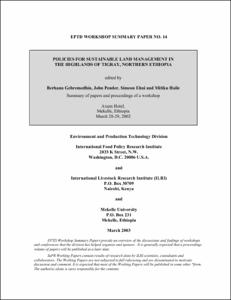Focal point
Location
About IFPRI
The International Food Policy Research Institute (IFPRI) provides research-based policy solutions to sustainably reduce poverty and end hunger and malnutrition in developing countries. Established in 1975, IFPRI currently has more than 500 employees working in over 50 countries. It is a research center of theCGIAR Consortium, a worldwide partnership engaged in agricultural research for development.
Vision and Mission
IFPRI’s vision is a world free of hunger and malnutrition. Its mission is to provide research-based policy solutions that sustainably reduce poverty and end hunger and malnutrition.
What We Do
Research at IFPRI focuses on six strategic areas:
- Ensuring Sustainable Food Production: IFPRI’s research analyzes options for policies, institutions, innovations, and technologies that can advance sustainable food production in a context of resource scarcity, threats to biodiversity, and climate change. READ MORE
- Promoting Healthy Food Systems: IFPRI examines how to improve diet quality and nutrition for the poor, focusing particularly on women and children, and works to create synergies among the three vital components of the food system: agriculture, health, and nutrition. READ MORE
- Improving Markets and Trade: IFPRI’s research focuses on strengthening markets and correcting market failures to enhance the benefits from market participation for small-scale farmers. READ MORE
- Transforming Agriculture: The aim of IFPRI’s research in this area is to improve development strategies to ensure broad-based rural growth and to accelerate the transformation from low-income, rural, agriculture-based economies to high-income, more urbanized, and industrial service-based ones. READ MORE
- Building Resilience: IFPRI’s research explores the causes and impacts of environmental, political, and economic shocks that can affect food security, nutrition, health, and well-being and evaluates interventions designed to enhance resilience at various levels. READ MORE
- Strengthening Institutions and Governance: IFPRI’s research on institutions centers on collective action in management of natural resources and farmer organizations. Its governance-focused research examines the political economy of agricultural policymaking, the degree of state capacity and political will required for achieving economic transformation, and the impacts of different governance arrangements.
Research on gender cuts across all six areas, because understanding the relationships between women and men can illuminate the pathway to sustainable and inclusive economic development.
IFPRI also leads two CGIAR Research Programs (CRPs): Policies, Institutions, and Markets (PIM) andAgriculture for Nutrition and Health (A4NH).
Beyond research, IFPRI’s work includes partnerships, communications, and capacity strengthening. The Institute collaborates with development implementers, public institutions, the private sector, farmers’ organizations, and other partners around the world.
Resources
Displaying 1126 - 1130 of 1521Policies for sustainable land management in the highlands of Tigray, northern Ethiopia
The papers presented at this workshop dealt with a wide array of topics related to land management in the highlands of Tigray.
Mettre fin a la famine en Afrique
Contrairement aux prévisions communément admises quant à l’aggravation du déclin économique de l’Afrique, une récente étude présente une vision alternative plus positive de l’avenir de ce continent. De nouveaux engagements politiques, une gestion du programme de développement sous égide africaine ainsi que l’accroissement de l’intérêt et des investissements dans les petites exploitations agricoles ont le potentiel d’arrêter, voire d’inverser la tendance spiroïdale de la famine, de la pauvreté, de la dégradation environnementale, des maladies et des guerres civiles.
Dynamic Intrahousehold Bargaining, Matrimonial Property Law, and Suicide in Canada
Economists who analyze household decisionmaking allocation have traditionally assumed that the household acts as a single unit. They assume that there exists one decisionmaker whose preferences form the basis of household welfare and that all household resources are effectively pooled. This approach is known as the “unitary model,” the “common preference model,” or the “joint family utility model,” depending on the study consulted.
Power and Resources within the Household: Overview
The collective model of the household predicts that bargaining power determines the share of resources allocated to an individual within the household. The concept of bargaining power is elusive, however. It is perhaps useful at this point to outline the possible determinants of bargaining power, while not making any claims to measure power itself.
Household decisions, gender, and development: a synthesis of recent research
This book synthesizes IFPRI's recent work on the role of gender in household decisionmaking in developing countries, provides evidence on how reducing gender gaps can contribute to improved food security, health, and nutrition in developing countries, and gives examples of interventions that actually work to reduce gender disparities. It is an accessible, easy-to-read synthesis of the gender research that IFPRI has undertaken in the 1990s.







